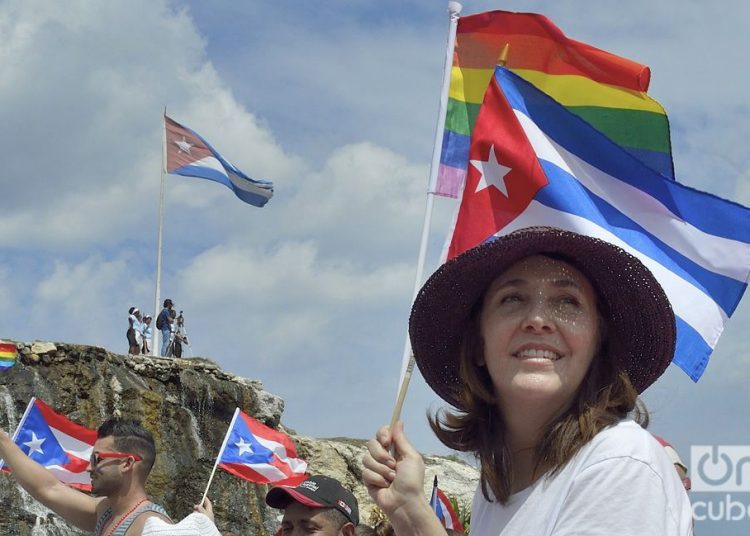Last week the 15th edition of the Cuban Days against Homophobia and Transphobia began in Havana. The event, which once again has in-person activities ― among them, the traditional conga through Havana’s Vedado district, scheduled for this Saturday, if it is not suspended due to the tragic events at the Saratoga Hotel ― after two years of restrictions due to the pandemic, is taking place just days after the official conclusion of the popular consultation process on the draft of the new Family Code, which is now entering a key stage for its definitive draft and its possible approval in a referendum by the Cuban population.
This is a significant moment for the island ― also marked by the economic crisis, progress against COVID-19, the echoes of last July’s protests and the growing migratory wave ―, in which fundamental rights and extensive and inclusive approaches are being settled regarding the realities and family dynamics of today’s Cuba, contemplated in the legislative proposal, but stigmas and prejudices long rooted in Cuban society also emerge, or rather, are exacerbated, and conflicting visions are confronted, and on antagonistic occasions, about society itself and the family institution in the country, and life in general.
It is a reality that cannot be ignored or underestimated, with ideological and even political implications, and that, even though it gains greater visibility in this scenario, it goes beyond the process related to the Family Code and points directly to the future of the country, according to Mariela Castro Espín, director of the National Center for Sex Education (CENESEX).
“It is something much deeper, much broader, and with important contradictions,” Castro Espín responded to OnCuba during the inaugural press conference of the Days against Homophobia and Transphobia. In her opinion, this is part of a “dangerous” international context, from whose resonances the island does not escape, and in which, in tune with “hegemonic interests of the great power groups,” “prejudices and fundamentalist, retrograde positions are strengthened, which one believed should already be overcome and should not return, but that, even so, are reintroduced and installed with tremendous force in all issues, including those related to sexuality.”
For the specialist, in these times the world is going through “like a medieval period of modernity,” in which these positions and prejudices have managed to escalate to the political level in several nations and have accelerated the polarization of their societies and also on a global scale. “What is happening is something tremendous,” she affirmed. “There are countries where fundamentalist positions have managed to position themselves, for example, on aspects related to the rights of LGTBIQ+ people, on which progress had already been made, and suddenly proposals from politicians and conservative groups who are trying to remove those rights start being seen. Also, on the voluntary intervention of pregnancy, to prevent it from being legally approved or to promote its prohibition where there is already a regulation in this regard.”
In this sense, she considered “terrible” the possibility that the Supreme Court of the United States reverse this right in the northern nation, and, with it, reverse “so many years of fighting for civil liberties.” The director of CENESEX compared these setbacks to a “witch hunt” and regretted that women are once again “hostages of the most conservative positions” and of “political tricks” to “deny them rights and conquests for which social, progressive movements have historically fought.” From her perspective, “preventing women from being able to decide on their bodies, from being able to fully exercise their rights, is the continuation of the historical policy of misogyny from the exploitative patriarchy” and the expression of “an arbitrary exercise of power” on them.
In this regard, she warned that “just as these retrograde, obscurantist thoughts begin to position themselves in some places, they also radiate to others. And in Cuba we have to be alert, active to prevent these tendencies, these fundamentalisms from taking a stand, which are not only religious, they are also political, ideological, and they are there, trying to see what terrain they manage to conquer. We cannot be naive in that sense. It really is a very dangerous moment for humanity, and we have to be aware of it, also in our country. We have to defend everything that for so many years we have been conquering and working for.”
The consultation, the Code, the churches
Regarding the popular consultation of the new Family Code, which has just ended on the island, Castro Espín classified it as “very valuable,” because, she said, it has made it possible to collect “very important information to know where the popular imagination is going in relation to family law and its related issues.” “It has been a living process, with people giving their opinions, participating, in which very valuable elements have been contributed that the drafting committee will now take into account, to introduce them and continue working on a regulation that better adjusts to the reality of all individuals and families,” she added.
The expert, daughter of former President Raúl Castro and the late women’s leader Vilma Espín, assured that “these processes are not linear or easy; they have a lot of debate, a lot of dialogue and discussions,” but she pointed out that “the important thing is that we all listen to each other, understand each other and move forward.” However, she recognized the importance of continuing the dialogue on the Family Code because, she said, “there are still neighborhoods and sectors that need this dialogue to continue, because their concerns are not always satisfied, and I believe that as long as there are possibilities to continue exchanging, to continue listening, before making the final decision, this must be done.”
The director of CENESEX pointed out that the Cuban Days against Homophobia and Transphobia, in its 15th edition, is part of that wish. Under the motto “All rights for all families,” the event has one of its main focal points in the new regulations, with workshops and other activities that will address several of the issues that have aroused the “most resistance” during the popular consultation. Among these, she mentioned solidarity gestation, same-sex marriage and adoption by same-sex couples, on which she specified that “work has been carried out, on the arguments, on the message lines aimed at delving into these issues.”
In addition, she announced that “a plan is being prepared for after the sessions of the National Assembly that involves activities and visits to these neighborhoods and sectors where more elements of this type have positioned themselves in the consultation.” With regard to churches and religious congregations, one of the sectors most resistant to the legislative draft ― with campaigns and public expressions of disagreement, even on national television―, Castro Espín explained that “the guidelines of the same policy implemented by our government and by the Communist Party, and its Department of Religious Affairs have been followed. The latter has been in permanent dialogue with religious and congregational leaders throughout this process, clarifying doubts, clearing up myths that exist on these issues, so that the leaders themselves can help their parishioners to better understand the draft of the Code, to reason their proposals.”
On the statements of an evangelical leader in a television program, contrary to various aspects of the regulation and laudatory of the role of the church in society — which the specialist considered as “very strict” positions —, she disagreed, because, she said, “This is a secular state.” “I respect it (the decision to broadcast the pastor’s statements), and I think there are reasons to have done it, but I personally did not like it, as so many people did not like it. But at the same time I liked that the population gave their opinion about it, with all the criteria that this generated,” she replied to OnCuba.
Despite episodes like this, and the contradictions and resistance that emerged from the consultation, Castro Espín confirmed her conviction that the Code will finally be approved by the majority of Cubans. Even that in the religious community there will also be people who will support it in the referendum. “I know that there are parishioners who are going to vote in favor, because when I have spoken with them they have told me that they agree,” she pointed out. “There are others, logically, who are going to vote against, because it is what their faith, their way of understanding life dictates. And there are others who recognize that issues such as marriage and adoption by people of the same gender generate a tremendous contradiction, but, at the same time, they consider that they should not be an obstacle to the approval of the Code, in which they recognize many benefits an advantageous elements in different aspects and for all people.”
“It is true that there are people who are absolutely convinced that things should not be as proposed by the Code draft,” she reiterated. “There are religious positions and dogmas that we are not going to change because they are deeply rooted in those parishioners, in the people who belong to those churches where they promote this type of ideas and have all their foundations. It’s okay. They will vote against, but another part will vote for, and I think that other part will be the majority. That is my perception.”
Beyond the Code
Although now all eyes are on the definitive draft of the Family Code, and its presumable approval, the director of CENESEX is aware that, even if it is achieved, this will not end the challenges to make a reality what the regulations propose. “We have to keep working. The law alone is not going to change prejudices, just as the approval of the Constitution did not transform them, but it is going to protect the rights of all people against those prejudices.”
“This process does not end with the approval of the new Code. Much remains to be done, but very important lessons have been learned,” she affirmed. In particular, she praised the communication work carried out by state institutions on this occasion, which she considered “excellent.” “It was much better than the one that was done for the Constitution, from which important lessons were learned, and now work has been done with much higher quality in that regard. We will see the result, but at least I have hope that a people who voted for the new Constitution is a people who will vote in its majority, perhaps not as high as that of 2019, but a majority for this Code, which is very innovative and advanced,” she reiterated.
Castro Espín also highlighted, “as part of learning,” that this process “has highlighted the importance of education, the responsibility of the school institution in addressing these issues.” In this regard, she defended the work that schools must carry out “in updating the formation of the young generations, in explaining the arguments and elements of analysis that must be provided so that they understand the importance of the legal system in society, of the legal protection of the rights of all people, so that they understand the importance of family law, and the concepts and ideas in this regard in the Code.” This, without neglecting the importance of making the regulation “more understandable,” of working in its language following the requests of the population itself, “because a law that people do not understand does not help them to acquire knowledge of their rights so they can exercise them fully.”
“This is a process that has an important legislative and legal component, but above all it has an educational and communicational component in the formation of citizens, of active citizenry, because knowing their rights will allow them to exercise them with full awareness, question them, strengthen their way of implementation, and thus encourage all social and community actors to use the law in all its richness and possibilities, and not impose a biased interpretation due to prejudices or fundamentalist and retrograde positions,” she concluded.









